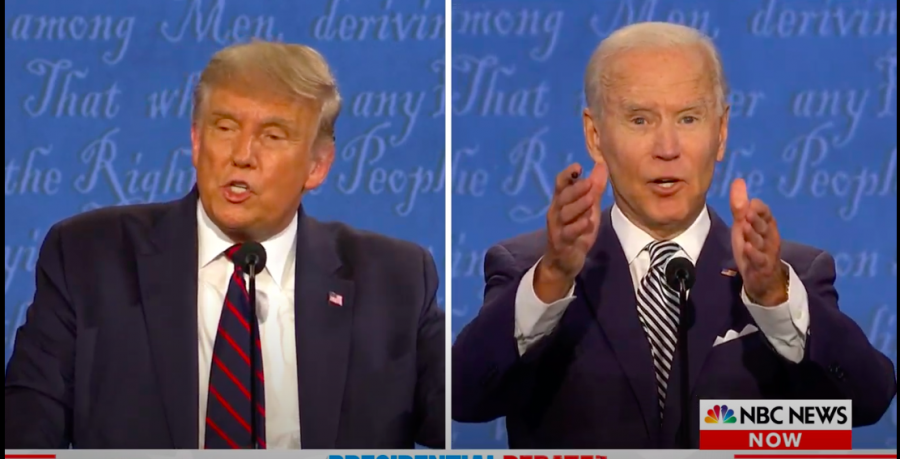Kincart: Ableism Has No Place in Political Critique
President Donald Trump and Former Vice President Joe Biden face off in Cleveland, OH on Sept. 29, 2020.
October 6, 2020
After Tuesday’s presidential debate, ableist commentary and opinions were again a large part of the post-debate discussion. Viewers criticized former Vice President and current Democratic Nominee Joe Biden for his stutter and President Trump for “forgetting his meds.”
https://twitter.com/TINY28TWT/status/1311140153436573697
Sadly, this ableist rhetoric isn’t new. Remember that 25-second clip from a few months ago of the President struggling to make his way down a ramp? If you don’t recall this, here is a refresher. This video prompted #TrumpIsNotWell, which used ableist rhetoric to degrade a political figure who can be attacked for plenty of other more substantial reasons. These types of attacks transcend partisan lines, targeting both Biden and Trump, and all of them are unacceptable. Ableism has no place in the media and public’s critiques of politicians — we need to focus our criticism on policy and other significant issues.
Ableism in the public at large is responsible for trending ableist hashtags such as #TrumpIsNotWell, #TrumpWaterChallenge, and #HowToRamp. This same public is simultaneously and correctly quick to reprimand the president for being ableist towards a disabled journalist. Why are we not equally upset when we hear our peers using ableist rhetoric in their political criticism?
The relationship between making fun of a disabled person because of their disability versus making fun of someone who is not disabled with ableist language is one that I would encourage readers to ponder. In my experience, many people are quick to understand the harms of the prior while not comprehending the harms of the latter. Above all, it doesn’t matter how this ableist rhetoric is being presented, it is still always going to be hurtful.
Additionally, taking into account the relationship between disability and mental illness, the public’s projection that all presidents are not disabled has been disproven. A neurotypical president isn’t an overarching historical commonality. Half of all presidents have suffered from some form of mental illness. So, claiming that candidates are unfit to serve because of ableist reasons is baseless given that disabilities have been prevalent in the presidency.
However, it’s unfair to pin the entirety of the problem of ableist rhetoric on the public at large. The media also plays a significant role in perpetuating this behavior. Major news sources like MSNBC and CNN have published material that perpetuates ableism. We also see it in ad campaigns, specifically this one targeting Hillary Clinton.
I’m not placing the blame entirely on media, but it does perpetuate this harmful rhetoric and consumers pick up on it. Not only is it ableist, but it is also an ad hominem fallacy — in other words, it’s just a bad way to argue that someone is unfit for elected office. The media should be above this. We should be using our platforms to highlight policy proposals that actually affect the public.
Placing the blame of ableist rhetoric is two-fold — the media needs to stop being ableist so that people stop being ableist and vice versa. This issue is cyclical and will never end until one of the parties does something about it. Instead, let’s criticize Trump’s ableist remarks. He has fat-shamed Gov. Chris Christie, mocked Hillary Clinton’s mobility and most importantly, sought to repeal the ACA which would make it legal to deny insurance due to preexisting conditions. These are all examples of ableism in their clearest form.
Donald Trump has earned the scathing critiques of his rhetoric, policies, corrupt Administration & disgraceful debate performance. However, given the many descriptors at your disposal, I appeal to analysts not to say things like, he is on drugs, forgot his meds, clearly has ADHD.
— Ayanna Pressley (@AyannaPressley) September 30, 2020
Painting a picture of Trump having a disability not only suggests all people with disabilities are ignorant but it sets aside his frightening ideology. Let’s evaluate his remarks fitting under the “-isms” and “-ists” — like nativism, protectionism, racism, sexism, islamophobia, homophobia, transphobia, etc. We should also pay attention to his concerning comments about a peaceful transition of power. When basic human rights are on the line, we need to be concerned. For this very reason, our remarks should be focused on the concerning ideology of the president instead of the way he walks down a ramp.
Using ableist language to belittle politicians is beneath us. America can do better. Many recognize that President Trump is a threat to maintaining, let alone advancing, civil rights. Let’s use our voices to amplify those that the President seeks to silence, instead of throwing out ableist attacks left and right. As we enter into the final weeks of election season as well as watch the upcoming debates, check yourself. Evaluate how you contribute to this problem, whether it be in speech or media consumption. This is the only way that we will grow closer to stopping the ongoing cycle of ableist speech in the political sphere.









Martha Neal • Oct 7, 2020 at 7:06 am
Excellent column! Somebody on your staff needs to pass this on to AP or NPR. …. Listen to the children ( or in this case next generation),,.. you give me hope for the future. Thank you!